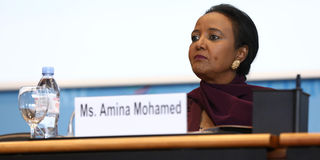Elevation of black women is a start, but we must take it further

What you need to know:
- Dr Ngozi’s story is long and thoroughly impressive, including a 25-year career at the World Bank.
- Amina is currently the Cabinet secretary for Sports, Culture and Heritage and was recently admitted to the Bar.
By the end of this year, the World Trade Organisation (WTO) will likely be headed by an African woman for the first time since its inception on January 1, 1995. The selection process to succeed Brazil’s Roberto Azevêdo, who steps down as WTO Director General on August 31, officially started on June 8 when governments were invited to send their nominees.
The nomination process closed on July 8 and the candidates have since been meeting separately with members of the General Council in a special session to make their presentations.
Of the eight nominees selected by the governments of Saudi Arabia UK, Nigeria, Kenya, South Korea, Moldova, Mexico and Egypt, three are women (Kenya, Nigeria and South Korea), and two are African women (Kenya and Nigeria).
According to Reuters news agency, “There is broad support for an African candidate and a woman, since neither have headed the Geneva-based body in the past, sources following the process said.” If these ‘sources’ familiar with the WTO’s board thinking are to be remotely trusted, it would mean that by November 7, an African might be at the helm of WTO.
IMPRESSIVE
The Nigerian candidate, Dr Ngozi Okonjo-Iweala, has been described as a ‘political heavy- hitter’ by Politico, and that “few doubt that [she] is a force to be reckoned with”. Dr Okonjo is a Harvard-educated economist with a PhD from MIT who served as Nigeria’s Minister of Finance. She currently sits on the board of Twitter, Standard Chartered PLC and is the chair of Gavi, the vaccine alliance.
Dr Ngozi’s story is long and thoroughly impressive, including a 25-year career at the World Bank, where she rose to the number two position of Managing Director, Operations. One of the things Dr Ngozi is remembered for as Minister of Finance, besides earning a reputation for being a ruthless corruption-buster, was that she negotiated with the Paris Club of Creditors a $30 billion debt relief package for Nigeria, including the ‘outright cancellation of $18 billion’, according to her official biography at the WTO website.
Closer home is Amina Mohamed, a woman of many firsts, just like her Nigerian counterpart. Amina is currently the Cabinet secretary for Sports, Culture and Heritage and was recently admitted to the Bar.
DEPUTY GENERAL COUNSEL
From 2002 to 2006, in her capacity as Kenya’s Permanent Representative and Ambassador to the WTO, Amina became the first woman to chair the General Council in 2005. She has also previously served Kenya’s government as CS Foreign Affairs, as well as Education, Science, Technology and Innovation.
It might appear that this is a moment of reckoning for Africans, seeing as this past week, IMF appointed an African – a Kenyan citizen Ceda Ogada as Secretary of the Fund.
The Harvard-educated Kenyan joined the IMF’s legal department in 1999 and rose to become the Deputy General Counsel in 2014 until his appointment as Secretary of Fund. In a statement released this week, IMF Managing Director Kristalina Georgieva noted that Ogada’s “…institutional knowledge… and intellectual heft… will help the fund to even more effectively serve our member countries in a very challenging economic environment”
It is not lost on me that all this is happening against background of the Black Lives Matter campaign, a global conversation recently bolstered by the killing of George Floyd. There seems to be a global awakening that is compelling the world to tackle sensitive and incredibly divisive issues such as systemic racism so deeply embedded in our societies. Global corporations have been doing away with racist practices like Walmart’s decision to stop locking ‘multicultural hair and beauty products’ in display cases.
HISTORICALLY MALE
International inter-governmental organisations such as the World Trade Organisation, whose leadership have been historically male and white, are now more open to diversity and the current selection process might be a step towards necessary inclusivity.
But it must not stop there. Critics might say that some of these moves – such as the inclusion of a black woman on a board or senior leadership positions – are deliberate moves to give the impression of diversity. And they may have a point, especially if these appointments are few and far between.
What we really need, besides these public appointments of black people, is to begin to change how we think about race, and the appreciation that black people, black women especially, bring more to the table than the colour of their skin.
Let us not have these appointments just to check the ‘diversity’ box, but as an appreciation of what people bring to the table, regardless of their skin colour, race or gender.
The writer is the director of the Innovation Centre at Aga Khan University Graduate School of Media and Communications. The views expressed in this column are hers; [email protected]





